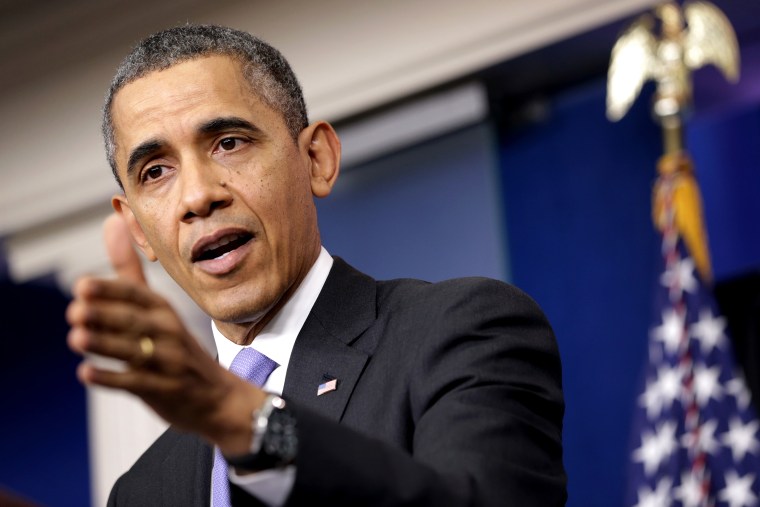Under pressure from Congress, the judiciary, and even his own advisory panel, President Barack Obama acknowledged that the National Security Agency's telephone metadata program may need to change.
"In light of the disclosures that have taken place it is clear that whatever benefits the configuration of this particular program may have may be outweighed by the concerns people have on its potential abuse," Obama told reporters during a press conference Friday. "And if that's the case there may be another way of skinning the cat."
The NSA's communications data gathering program has come under harsh criticism over the past week over its legal foundation and its effectiveness in fighting terrorism. On Tuesday a federal judge, citing the "almost-Orwellian" technology in the government's hands, ruled that the program was likely unconstitutional. Then on Wednesday, an advisory panel of legal and national security experts appointed by the president himself recommended a total restructing of the program that would bring NSA surveillance under greater court scrutiny and leave communications data in the hands of private companies. The report also suggested that the program had been of little use in fighting terrorism.
Legislators in Congress who had been pressing to end the NSA's bulk collection of communications data, such as Democratic Senator Patrick Leahy, claimed vindication. "The message to the NSA is now coming from every branch of government, from every corner of our nation, ‘NSA you have gone too far," Leahy said on the Senate floor on Tuesday after the court ruling.
Obama didn't go that far in his press conference, or clearly state what changes he would be willing to make. "Programs like [the metadata program] could be redesigned in ways that give you the same information that you need it without creating these potentials for abuse," Obama said Friday. "That's exactly what we should be doing is to evaluate all these things in a very clear specific way and moving forward on changes."
Without the disclosures facilitated by former NSA contractor Edward Snowden, who leaked evidence of the breadth of the metadata gathering program in June and is now in temporary asylum in Russia, it's unlikely any of this would have happened. The court ruling against the NSA would ever occurred because the plaintiffs would not have been able to prove their data had been collected, that the White House would have seen no need to appoint a review panel to oversee the policy, and the only legislators in Congress pushing to reform the Patriot Act would be the small group of civil libertarians who had always done so.
As a result, groups like the ACLU have called for the U.S. government to grant Snowden amnesty, reasoning that his disclosures have been in the public interest. Others have argued that Snowden's additional disclosures, such as revealing Chinese targets of U.S. surveillance, justify prosecution. When asked by a reporter whether Snowden should be granted amnesty, Obama said that "I will leave it up to the courts and the attorney general to weigh in publicly on the specifics of Mr. Snowden's case."
"As important and as necessary as this debate has been, it is also important to keep in mind that this has done unnecessary damage to U.S. intelligence capabilities and U.S. diplomacy," Obama said.
Yet if it had been left up to Obama, it's unlikely that "important and necessary" debate would have ever happened--prior to Snowden's disclosures, the Obama administration had effectively used the veil of official secrecy to shield the NSA's activities from scrutiny by the public, the courts, and all but the most engaged federal legislators.
Although the political climate could change once again, six months after Snowden's dislosures changes to national security law now seem almost inevitable.
